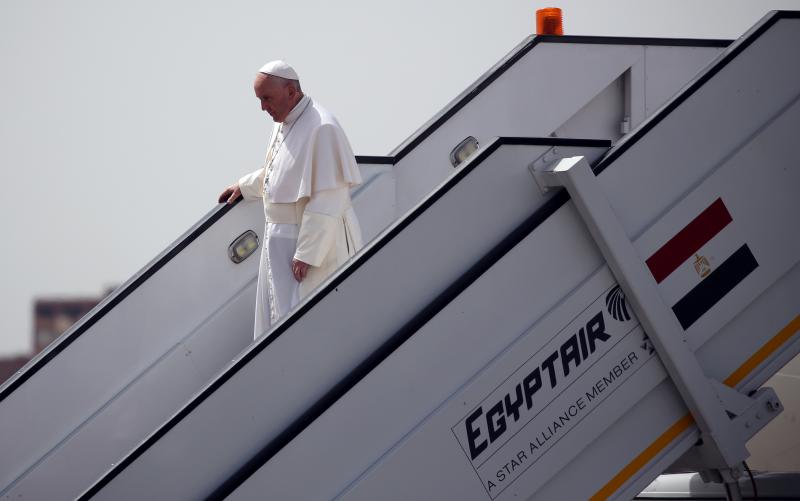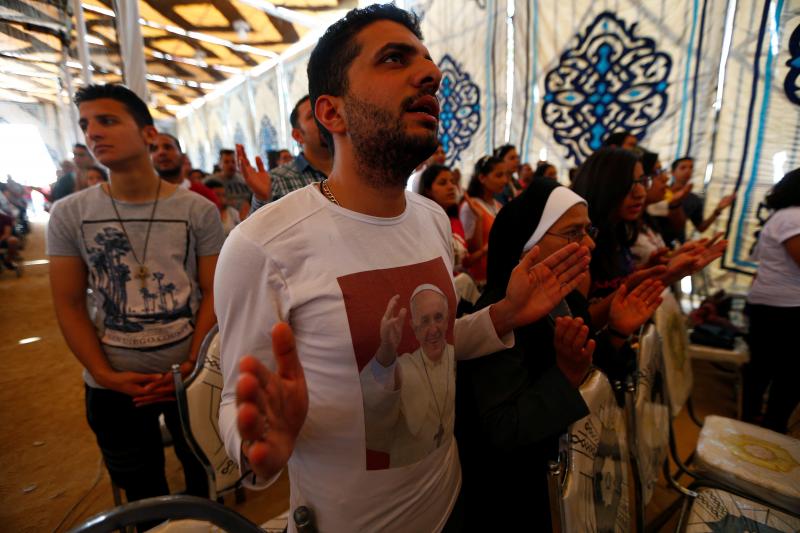CAIRO — Pope Francis, starting a two-day visit to Egypt, urged Muslim leaders on Friday to unite in renouncing religious extremism at a time when Islamist militants are targeting ancient Christian communities across the Middle East.
Francis's trip, aimed at improving Christian-Muslim ties, comes just three weeks after Islamic State suicide bombers killed at least 45 people in two Egyptian churches.
"Let us say once more a firm and clear 'No!' to every form of violence, vengeance, and hatred carried out in the name of religion or in the name of God," the pope told a peace conference at Egypt's highest Islamic authority, Al-Azhar.
Francis is meeting an array of religious and political leaders in his brief stay, telling reporters travelling on his plane that he was carrying a message of peace and unity.
Eschewing the armoured motorcades normally reserved for visiting heads of state, the 80-year-old pontiff instead clambered into a simple Fiat car on his arrival, and, with his window wound down, drove off into the heavily guarded capital.
"Pope of Peace in Egypt of Peace," read posters plastered along the largely deserted road leading from the airport.
2017-04-28t125209z_1_lynxmped3r14g_rtroptp_4_pope-egypt.jpg

He is the second pope to visit Egypt, the most populous Arab nation, following John Paul II, who came in 2000, a year before the September 11 attacks on the United States that convulsed Western relations with the Muslim world.
While Egypt has escaped the sort of violence that has engulfed Syria and Iraq, its Christian community has felt the full force of Islamist militants over the past six months, with bomb attacks in several churches.
"It is our duty to unmask the peddlers of illusions about the afterlife, those who preach hatred in order to rob simple people of their present life," the pontiff said in his second speech of the day, to Egyptian President Abdel Fattah al-Sisi.
"Egypt is on the front lines of the confrontation against terrorism, which our nation is bearing with steadfastness and sacrifice ... determined to defeat it and end it and to hold on to our unity and not let it divide us," Sisi said.
Sisi's attempts to bring security to Egypt have been rattled by attacks on Christians, but a successful papal visit will help bolster his country's international image.
The Egyptian president seized power in 2013, ousting the Muslim Brotherhood and its Islamist supporters from office in a bloody crackdown.
The pope appeared on Friday to criticise the notion of political Islam, saying: "Religion risks being absorbed into the administration of temporal affairs and tempted by the allure of worldly powers that in fact exploit it."
'Hatred and Violence'
The pontiff has repeatedly said that Christian-Muslim dialogue is the only way to confront Islamist fundamentalism, but his message carried special resonance inside Al-Azhar, where he was a guest of its Grand Imam, Sheikh Ahmed al-Tayeb, widely considered among the most moderate clerics in Egypt.
In his own speech, Tayeb said militants had "carelessly" and "ignorantly" misinterpreted religious texts. "Islam is not a religion of terrorism," he said.
Francis stressed the importance of good education. "To counter effectively the barbarity of those who foment hatred and violence, we need to accompany young people," he said.
2017-04-28t103717z_1_lynxmped3r0u8_rtroptp_4_pope-egypt.jpg

Tayeb visited the Vatican last year, restoring relations with the Roman Catholic Church after they had been cut in 2011 in protest at what Egyptian Muslim leaders said were insults directed at Islam by Francis's predecessor, Pope Benedict.
The pope has been applauded by moderate Muslims for his efforts to improve relations. He has washed the feet of Muslims during Holy Week ceremonies and last year brought Syrian Muslim refugees back to Italy with him from a Greek migrant centre.
His visit to Cairo is also aimed at bolstering sometimes frosty relations with Coptic churches, and he met Pope Tawadros II, head of the Coptic Orthodox Church, who narrowly escaped a church bombing in Alexandria this month.
He went to Cairo's largest Coptic cathedral to pray for the 28 people killed in a Christmas season blast last year and lay flowers in their memory. Copts represent about 10 percent of Egypt's 92 million population.
Christians complain that they are ostracised by the state and do not enjoy the same rights as the Muslim majority.
"It's in the state's interests to protect its nationals and the Copts are not an independent people, they are part and parcel of the nation itself," said Father Boulos Halim, spokesman of the Coptic Orthodox church.
Jean-Francois Xavier, of the French Catholic church's office for Christian-Muslim relations, said Egypt's Christians felt sadness and fear but the pope's visit "gives us new hope because we have to believe that a human being is able to build peace for the world".
Got something to say about what you're reading? We value your feedback!
